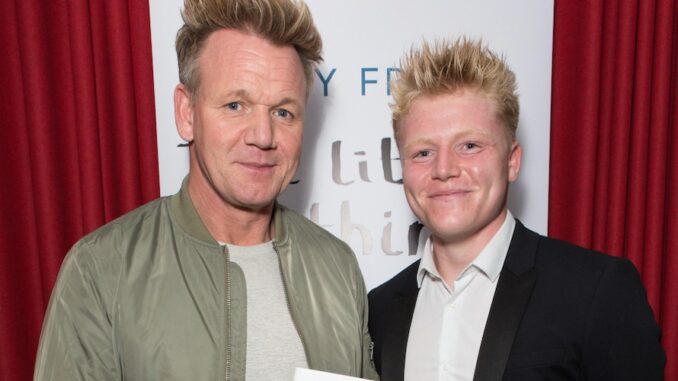
To the world, Gordon Ramsay is a storm in a chef’s jacket — a culinary tyrant famous for his razor-sharp critiques, volcanic temper, and unforgettable soundbites like “It’s raw!” or “Shut it down!” He’s the face of kitchen perfectionism, the nightmare of amateurs, and the idol of aspiring professionals. But beneath the shouting and scolding lies a side of Ramsay that rarely makes it to the final cut. The truth? Gordon Ramsay is far more than just the man who terrifies cooks on reality TV. He’s a deeply layered human being — a survivor, a father, and a mentor whose fire is fueled not by ego, but by love.
A Childhood Marked by Pain — and Resilience
To understand Ramsay’s passion, you have to understand his past. Gordon didn’t grow up in a pristine kitchen or a supportive home. He was raised in a turbulent household, with an abusive, alcoholic father who made life unpredictable and often terrifying. As a child, Gordon moved frequently, rarely finding stability — emotionally or physically. Food became one of his few constants, a world he could control, perfect, and eventually escape into.
His rough upbringing didn’t harden him into cruelty — it made him sensitive to suffering and deeply protective of those he cares about. When he demands the best, it’s because he knows how hard life can be without discipline, without excellence, without a purpose to fight for.
Gordon the Dad — And the Softest One in the House
When he’s not in front of the cameras, Gordon Ramsay is a father of five. And the man who’s famous for bringing chefs to tears has no problem shedding them himself when it comes to his children. He speaks openly about how fatherhood changed him — how watching his kids grow up brought a softness to his life that he never knew he needed.
Whether it’s attending school events, teaching his kids how to cook, or simply goofing off with his youngest son Oscar on Instagram, Gordon’s love for his family is unfiltered and fierce. He once broke down in tears discussing how proud he is of his daughter Tilly, especially after her journey on Strictly Come Dancing. These moments reveal a side of Gordon that fans rarely get to see — a side defined not by control, but by care.
The Tears He Didn’t Hide
Contrary to popular belief, Gordon Ramsay is not emotionally numb. In fact, some of the most powerful moments in his career came not from shouting matches but from tears. On shows like Kitchen Nightmares and Gordon Ramsay’s Future Food Stars, viewers have occasionally seen the curtain fall away. Whether he’s mourning the loss of a struggling restaurant, listening to a chef’s personal tragedy, or reflecting on his own failures, Ramsay has shown that his anger often masks a heart that feels deeply.
One of the most memorable moments came when he visited a struggling restaurant run by a couple on the brink of bankruptcy. Seeing the emotional and financial toll it was taking on their family, Ramsay fought back tears and changed the tone entirely. No more shouting — just empathy, advice, and action.
More Than a Critic — A Mentor Who Gives Second Chances
While he’s known for cutting remarks, Gordon Ramsay has also built his legacy by lifting others up. Behind the scenes, he’s mentored dozens of chefs — many of whom credit him with saving their careers, or even their lives. On Hell’s Kitchen, he often spots potential where others see failure. He’s given contestants second and even third chances, paid for culinary school, and hired former competitors to work in his restaurants around the world.
He doesn’t demand perfection because he enjoys watching people fail — he does it because he believes in their potential. He sees greatness in people before they see it in themselves. And sometimes, the yelling is just a push — from someone who never had anyone push him toward the light.
Excellence Rooted in Care, Not Cruelty
At the heart of Gordon Ramsay’s intensity is an unwavering belief that food is everything. It’s art. It’s identity. It’s redemption. His standards are brutal because the stakes are high — not just for the plate, but for the person behind it. He doesn’t tolerate mediocrity because he knows how quickly a missed opportunity can become a lost dream.
His rage isn’t mindless — it’s rooted in care. When he shouts at someone, it’s usually because he knows they can do better. And when they finally rise to the occasion, no one beams with more pride than Gordon himself.
